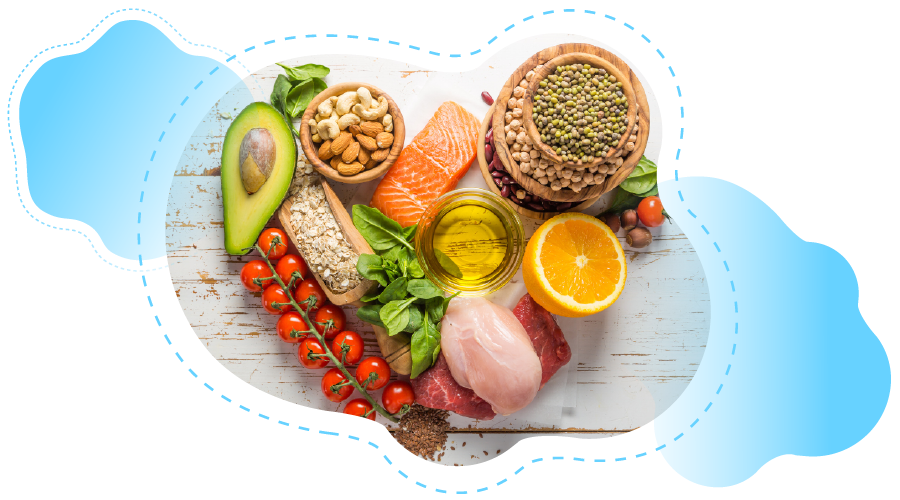Our diet plays a major role in our physical and mental health in all stages of life. A poor diet can negatively impact physical activity and sporting performance. We need a balanced diet of complex carbohydrates, protein, good fats, vitamins and minerals to fuel our daily functioning and physical activities. It is also absolutely crucial to help us achieve a healthy weight without losing our lean mass (muscles) (1, 2).
Busy lives can make it easy to slip into less-than-optimal eating habits, and we can be hard on ourselves if this happens. It can also be overwhelming if we want to make some positive changes, and don’t know where to start. So, where do we start?

To begin with, make small, sustainable changes to your diet. Every step forward, no matter the size, is a step in the right direction. Once you’ve started, a great way to stay on track is to focus on simply improving, not perfecting, your diet. If you want to boost your efforts you can incorporate dedicated meal prep and some smart swaps.
Australian Dietary Guidelines were developed by the National Health and Medical Research Council of Australia to help Australians get the energy and nutrients they need and maintain a healthy weight. It suggests consuming a variety of foods from five groups including fruits, vegetables, grain and cereals (mostly wholegrain), lean meat and alternatives, and dairy products and alternatives (mostly reduced fat). The guidelines also recommend limiting the intake of foods high in saturated fats, added salt, added sugar and alcohol. Most of these are abundant in junk foods, processed foods and most restaurant and takeaway foods. And yes, a healthy diet has a very limited amount of these foods.
Does trying to follow the guidelines mean that you need to spend hours preparing meals every day? And does this end up being more expensive than eating out? Unfortunately, these are well-populated myths (3). In fact, if planned, cooking at home can save you time and money. For example, you can spend a couple of hours on the weekend shopping and cooking for the entire week.
“Meal prepping on one day eliminates the time you need to think and prepare food every day, you can just grab a meal and go!”
Do you want to know how you can save money off your food bill and still eat healthy and tasty? Read this Conversation article and tips below.
Tips for smart and easy meal preparation:
- Make a couple of options to provide some variety so you aren’t having the same meal every day.
- Pre-cook different ingredients and mix them during the week to create tasty meals. For example, cook your pasta, brown rice, chicken, beef, and vegetables on Sunday and store them in separate small reusable containers. Each day, grab what you and your family members desire and mix them together with some canned beans, fish, cheese, fresh or frozen vegetables, or salad, to make a delicious healthy meal.
- Pre-cut carrots and celery so they are ready to grab from the fridge to snack on with your favourite dip.
- Look for healthy versions of your favourite sweet or savoury snacks so you can make them yourself at home. Check out QCWA’s Country Kitchens for some delicious and healthy recipes!
A balanced healthy diet is absolutely necessary for a healthy mind and body (4). Just remember while you’re on the path to get there, it is “improving, not perfecting your diet” that matters. Every step you take to improve your diet, and your family’s, counts.
Smart swaps and simple steps you can take to improve your diet:
- Replace white bread and rice you eat with wholemeal bread and brown rice.
- Swap out full-fat milk for low-fat milk.
- Reduce the number of sugary drinks you have each day or switch to sugar-free drinks.
- Gradually lower your sugar intake. Changing from 3 teaspoons of sugar with tea to 2 teaspoons is much easier and more sustainable than from 3 to none! You need to gradually train your taste buds!
- Eliminate or reduce the amount of salt you add to foods. Add lime or lemon near the end of cooking, it brings up the natural saltiness of the food, or add black pepper and spices.
- Trim the fat off any chicken and meat.
- Instead of mayonnaise sauce on your sandwich, add hummus and replace your sour cream with Greek yoghurt. Mix your white sauce or salad dressing with yoghurt.
- Use an air fryer for frying instead of deep or oil frying.
- Have you tried kale chips or cauliflower chips? They are good replacements for potato chips.
“If you do eat out once or twice a week, don’t worry! Making good choices on most days, allows you to be flexible and realistic about enjoying a treat here and there.”
Tips for smart choices when eating out:
- Swap out salami and ham for turkey or chicken when ordering a sandwich.
- Choose grilled fish instead of crumbed or battered fish.
- Ask for veggies on the side instead of chips.
- Say no to takeaway “meal” or “upsize” offers (you will save more money too)
- Avoid pies, pastries, and deep-fried foods from a service station and choose a wholegrain sandwich with some salad from a café instead.
- Eat slowly and save some of your meals for later.
For more information on the Australian Dietary Guidelines, including serving suggestion recommendations for each food group based on age and gender, visit: eatforhealth.gov.au Australian Dietary Guidelines
Here are some useful links for more tips on healthy eating and food choices:
About the Author
Saman Khalesi is Senior Lecturer and Discipline Lead – Nutrition, at the School of Health, Medical and Applied Sciences, CQUniversity. He completed a post-doctoral fellowship from the National Heart Foundation of Australia and received a Queensland Tall Poppy Science Award in 2022 for his research impact in equipping consumers with tools to identify dietary misinformation and making informed food choices.
Dr Khalesi is happy to discuss and clarify the information provided in the article. He can be found on LinkedIn and Twitter or via email at s.khalesi@cqu.edu.au

References
- Queensland Government. Dieting and weight management: Queensland Government; 2018 [Available from: https://www.qld.gov.au/health/staying-healthy/diet-nutrition/diet.
- Genton L, Melzer K, Pichard C. Energy and macronutrient requirements for physical fitness in exercising subjects. Clin Nutr. 2010;29(4):413-23.
- Lee AJ, Kane S, Herron L-M, Matsuyama M, Lewis M. A tale of two cities: the cost, price-differential and affordability of current and healthy diets in Sydney and Canberra, Australia. International Journal of Behavioral Nutrition and Physical Activity. 2020;17(1):80.
- Grajek M, Krupa-Kotara K, Białek-Dratwa A, Sobczyk K, Grot M, Kowalski O, et al. Nutrition and mental health: A review of current knowledge about the impact of diet on mental health. Front Nutr. 2022;9:943998.
The Activate Your Everyday Series is proudly supported by the Queensland Government and Health and Wellbeing Queensland through ActiveKIT Round 2
